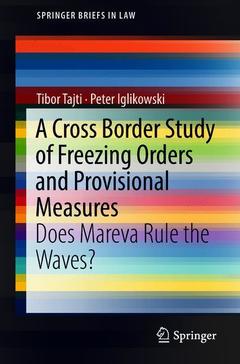Description
A Cross Border Study of Freezing Orders and Provisional Measures, 1st ed. 2018
Does Mareva Rule the Waves?
SpringerBriefs in Law Series
Language: English
Subject for A Cross Border Study of Freezing Orders and Provisional...:
Publication date: 07-2018
Support: Print on demand
Support: Print on demand
Description
/li>Contents
/li>Comment
/li>
This book compares the law on provisional measures of common law and civil law countries, the goal being to identify and compare their main advantages and disadvantages. The guiding concept is a well-known statement by the Justices of the US Supreme Court expressed in the famous Grupo Mexicano case, according to which the ?age of slow-moving capital and comparatively immobile wealth? has now passed, and the 21st century requires a fresh look at the law of provisional measures.
In the quest to find a model for interim relief, the Mareva Injunction, subsequently renamed the ?Freezing Order? in the English Civil Procedural Rules, is used as the benchmark to which each of the targeted systems discussed here is compared. This is because international scholarship, as well as e.g. the US Supreme Court, generally consider the Mareva Injunction to be the most effective and farthest-reaching provisional remedy.
The analysis suggests that the Mareva Injunction / Freezing Order represents the type of relief that will most likely continue to dominate as the most efficient and farthest-reaching interim measure in the years to come.
Introduction.- Provisional measures in France and the United Kingdom.- Provisional measures in the United States.- Post-socialist jurisdictions: Provisional measures in Hungary.- The European account preservation order: Nuclear weapon or paper tiger?.- Conclusions and possible ways forward.
Provides a comprehensive coverage on the comparative merits of the remedies available to attach assets in common law and civil jurisdiction
Demonstrates that the major legal systems are competing, especially with regard to provisional and ex parte measures
Written for comparative law academics and practitioners in international commerce
© 2024 LAVOISIER S.A.S.




